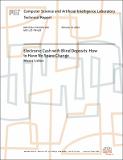| dc.contributor.author | Liskov, Moses | |
| dc.contributor.other | Theory of Computation | |
| dc.date.accessioned | 2005-12-22T12:00:00Z | en_US |
| dc.date.available | 2005-12-22T12:00:00Z | en_US |
| dc.date.issued | 2003-10-14 | |
| dc.identifier.other | MIT-CSAIL-TR-2003-022 | |
| dc.identifier.other | MIT-LCS-TM-639 | |
| dc.identifier.uri | http://hdl.handle.net/1721.1/30427 | |
| dc.description.abstract | Electronic cash schemes in which the bank authenticates many coins at once suffer from the problem that coins that are authenticated together can be linked to one another. Unfortunately, unless a user spends coins in a closely prescribed manner, different batches of coins ("wallets") will be linked together in these schemes. This is illustrated by the problem of what a customer does with the "spare change" - an unusable small amount of money left in a wallet. We propose a new protocol to be used in e-cash schemes: blind deposits. In a blind deposit, a customer returns a coin to the bank without revealing the coin. We present a secure and efficient e-cash scheme with this added feature based on that of Liskov-Micali [LM01]. | |
| dc.format.extent | 13 p. | |
| dc.format.extent | 12754502 bytes | |
| dc.format.extent | 526739 bytes | |
| dc.format.mimetype | application/postscript | |
| dc.format.mimetype | application/pdf | |
| dc.language.iso | en_US | |
| dc.relation.ispartofseries | Massachusetts Institute of Technology Computer Science and Artificial Intelligence Laboratory | |
| dc.title | Electronic Cash with Blind Deposits: How to Have No Spare Change | |
